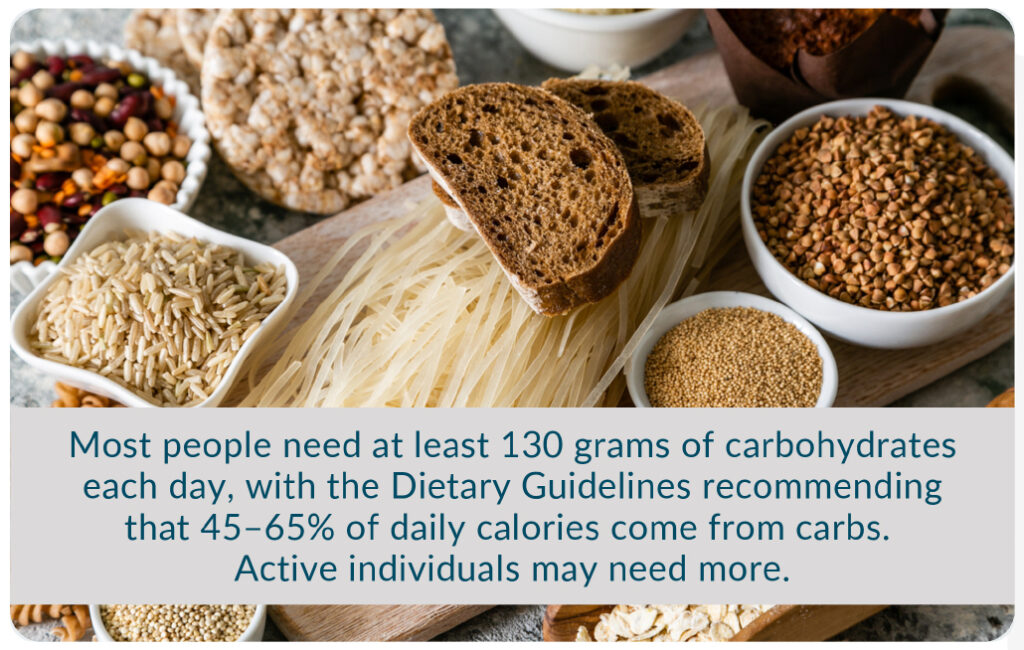Here’s Why Carbohydrates Belong in a Healthy Diet
So, Carbs Aren’t the Enemy!?
Carbohydrates are often demonized, but if the carbohydrates eaten are high quality options, they are a benefit to our health. Carbohydrates are sugars in food. They are naturally found in fruits, vegetables, nuts, seeds, grains, and dairy products. Carbohydrates also may be added to processed foods in the form of processed sugar such as white sugar and high fructose corn syrup.
There are three main types of carbohydrates:
- Simple carbs, called sugars. Simple sugars are made of one or two types of sugar. Fructose is a simple sugar found in fruit and honey. Sucrose is table sugar and lactose is the sugar found in milk.
- Complex carbs, called starch. Complex carbohydrates are made of many sugar units bonded together. Starch occurs naturally in vegetables, grains, beans, and peas.
- Fiber. Fiber also is a complex carbohydrate. It occurs naturally in fruits, vegetables, whole grains, and cooked dry beans and peas. Fiber doesn’t break down in the body. It can be used by some bacteria in the gut, and it also helps move waste through the digestive tract. Carbohydrates break down into energy sources for the body, especially the brain.
Fuel Your Body the Right Way
Carbohydrates are the body’s main fuel source. During digestion, complex sugars and starches are broken down into glucose, which is the main type of sugar used by the body for energy.
A NIH review of different studies found consuming more whole grains, vegetables and fruits was associated with significant decreases in risk of death and disease. This included a nearly 20% decrease in risk of all-cause mortality and a 10–20% decrease in risk of coronary heart disease with higher intakes of whole grains, vegetables, and fruits. There was a greater than 20% decrease in risk of type 2 diabetes, a 16% reduction in risk of colorectal cancer, and overall cancer mortality with higher intakes of whole grains.
The greater the intake of vegetables and fruits, the better the outcomes were. For every 6 ounces of vegetables and fruits consumed per day, overall mortality decreased 10%, cardiovascular disease risk decreased 8%, stroke risk decreased 16%, and cancer risk 3%. So, if you eat 12 ounces of vegetables and fruits per day, risk of overall mortality decreases by 20%. The decrease in risk did not improve if over 24 ounces were eaten per day.
Health research suggests that people need at least 130 grams of carbohydrates every day to meet the body’s energy needs. But the Dietary Guidelines for Americans recommend that carbohydrates make up 45% to 65% of total daily calories. More active people tend to need more carbohydrates.

The Nutrition Facts label shows total carbohydrates, which includes fiber, total sugars, and added sugars. Choosing foods with little added sugar and more fiber are better options.
Whole grains are packed with good nutrition. As a whole food, grains can provide vitamins, minerals, fat, protein, fiber and other beneficial compounds. Aim for at least half of your grains to be whole and not refined. Choose refined grains that are enriched with B vitamins, iron and folic acid.
Whole fruits and vegetables are powerhouses of nutrition. Vegetables, especially, offer large amounts of vitamins and minerals in very few calories. Try to choose fresh or frozen options and avoid those with extra salt, sugar, and fat added.
Milk, yogurt, and other dairy products are good sources of calcium, protein, phosphorus, and potassium. Choose low-fat versions to help limit saturated fat. And watch out for dairy products that have added sugar.
Beans, peas, and lentils are protein-packed vegetables. They add fiber, vitamins, minerals, plant-based iron and health-supporting fats to the diet. They are a good source of protein and can be a healthy substitute for meat.
Food and drinks, such as candies and soda contribute little nutrition. Check the Nutrition Facts label for added sugar to keep track. It is recommended to eat less than six teaspoons or 24 grams of added sugar per day.
Your activity level, diet, insulin response and gut all factor into what carbs are best for you. With attention to your needs, and some limits, you can make carbohydrates a part of a healthy diet.






